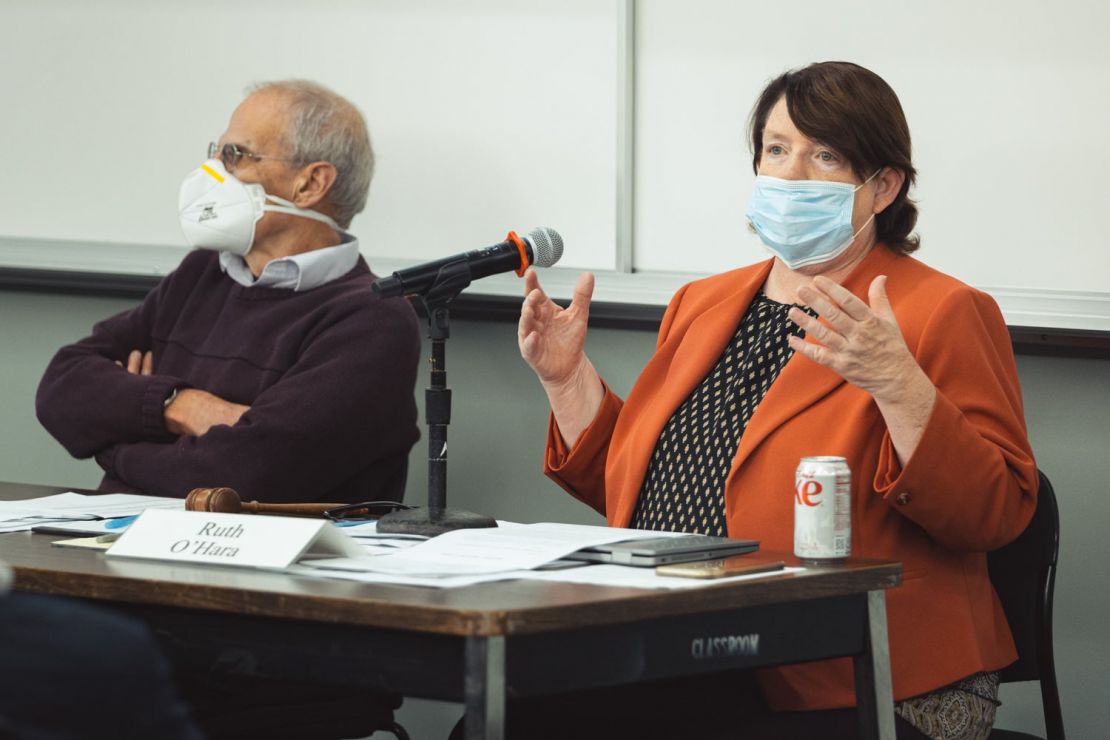When Dr. Ruth O’Hara walks through campus, it’s often hard for her to reach her destination without delay. The professor of psychiatry and behavioral sciences regularly bumps into many people she knows across campus, and she can’t help but say “hello.”

Ruth O’Hara, professor of psychiatry and behavioral sciences, serves as chair of the 2021-2022 Faculty Senate of the Academic Council. (Image credit: Andrew Brodhead)
“She’s a mentor to a lot of people, and she cares,” said Makoto Kawai, clinical associate professor of psychiatry and behavioral sciences at Stanford Division of Sleep Medicine. “She helps people to achieve their career goals, and she always knows how to help people.”
O’Hara is the Lowell W. and Josephine Q. Berry Professor at Stanford and is the director of Stanford Center for Clinical and Translational Research and Education (SPECTRUM), as well as the senior associate dean of research at the Stanford School of Medicine. In 2021, she was elected as chair of the Faculty Senate.
Kawai met her in 2014 when he joined a psychiatry postdoctoral fellowship and soon became one of O’Hara’s many mentees.
“I’m always very eager to help our junior faculty get a foothold, understand the systems that they’re dealing with and give advice,” O’Hara said. “I like pulling entities together, thinking how we can be best primed for the future as well as responding in the short term.”
‘Platform and guide’
As Faculty Senate chair, O’Hara runs the Faculty Senate and its Steering Committee meetings. The chair, elected by the incoming senate for a one-year term, gives an annual report at the Annual All-Academic Council meeting and sits on the President’s Executive Council.
O’Hara enjoys roles like this “where I feel I can help and work with our faculty, colleagues and staff to improve things,” she said. “There’s so much strength here in every domain, but we can always do better.”
In particular, she’s focused on improving communication and civil discourse.
“We have an opportunity to be a platform and guide for the institution to enhance and bring back civil discourse among those of us with very different perspectives,” O’Hara said.
Toward that end, O’Hara, Senate Vice Chair Mark Horowitz – the Yahoo! Founders Professorship in the School of Engineering – and Provost Persis Drell, initiated a standing weekly faculty lunch this past fall where faculty can discuss any topic.
“We want to encourage re-engagement, rebuilding of community and an ability to have difficult conversations in as friendly and congenial a manner as possible,” O’Hara said.
Leanne Williams, a professor of psychiatry and behavioral sciences, met O’Hara more than a decade ago and said she is a natural leader who “walks the talk.”
“She has the rare ability to knit together faculty, disciplines and systems,” Williams said. “This takes an incredibly creative approach. It takes a capacity to relate to different scientific and operational approaches, and deeply understand them, bottom-up and top-down.”
As Faculty Senate chair, O’Hara helped the university community navigate through a collision of crises including the pandemic, national events and rapid changes in the academic environment, Williams said.
“Everybody respects her. She listens. Her voice matters,” Williams said. “She was a role model in forging a path through crises that respected academic freedom, engaged students, increased civil discourse and gave us concrete steps to advance our institutional missions.”
‘What might be’
O’Hara grew up in Ireland and earned her master’s degree in experimental psychology from University College in Dublin. She struggled to find work, however, as psychology was still a nascent field in Ireland, which was also struggling through an economic depression.
“It was a good time to consider what might be,” she said.
O’Hara moved to the U.S. with her family when she was 25. Her mother taught the Irish language at the University of California, Berkeley for ten years.
“We’ve really thrived here,” O’Hara said of her family. “I found a tremendous openness in academia in the United States to being heard, to being able to pursue one’s ideas and enthusiasm for hard work.”
She earned her doctoral degree in experimental psychology from the University of Southern California and completed a postdoctoral fellowship at the University of California, Los Angeles.
O’Hara came to Stanford for a postdoctoral fellowship in 1998 and became a junior faculty member in the Department of Psychiatry in 2000.
“Stanford had a phenomenal reputation as being a school that was highly innovative as well as a place of excellence, particularly in the domain of cognition and cognitive psychology,” she said.
O’Hara is an expert on the integration of psychological, biological and genetic approaches to understanding cognitive function. Her research focuses on how the way we process information cognitively – such as in memory and attention – contributes to psychiatric symptoms like disordered thinking or schizophrenia, and they might be addressed.
In 2016, she was honored with an award for faculty excellence fostering undergraduate research. Last year, O’Hara was also listed as having the sixth-highest level of National Institutes of Health funding among 500 NIH-funded investigators in psychiatry nationwide.
“The greatest joy I get at Stanford is people are open to your thoughts and ideas and ways of doing things differently,” O’Hara said. “And we’re still a small enough community that you can do that at a very individual and personal level.”